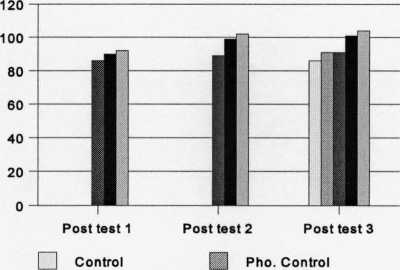7.4.2.2 The Understanding measures
The Direct Measures
7.4.2.2.1 Multiple choice task
Scoring criteria for the multiple choice task
Each child had to answer four questions. To be scored correct, the response had to be the
accurate pointing to the target word on the plate. Any other response (pointing) was scored
as incorrect. Each child could get a score from 0- 4. An error analysis was also carried out.
Analysis
Figure 7.4 presents children’s performance on the multiple choice task by group across
testing. There was a maximum group score of 104. As Figure 7.4 shows, all the groups
almost reached a ceiling level.
Figure 7.4 Total number of correct responses on the multiple choice task by group
across testing

H Oste. Definition ■ Lexical contrast
Γ~∣ Definition
Is there a differential impact of the type of exposure to new lexical items that the children
receive on their performance on the multiple choice task ?
Three One Way Analyses of Variance were carried out. Significant differences were found
for post test 2 (Kruskall-Wallis, I-Way ANOVA X2=8.8, df=2, p<.05) and post test 3
(Kruskall-Wallis, I-Way ANOVA X2=14.02, df=4, p<.05). Post-hoc analysis revealed no
significant differences during post test 1. During post test 2 the Definition group performed
204
More intriguing information
1. The Global Dimension to Fiscal Sustainability2. AMINO ACIDS SEQUENCE ANALYSIS ON COLLAGEN
3. National curriculum assessment: how to make it better
4. Institutions, Social Norms, and Bargaining Power: An Analysis of Individual Leisure Time in Couple Households
5. Fiscal Sustainability Across Government Tiers
6. The East Asian banking sector—overweight?
7. The name is absent
8. Visual Perception of Humanoid Movement
9. THE EFFECT OF MARKETING COOPERATIVES ON COST-REDUCING PROCESS INNOVATION ACTIVITY
10. Are class size differences related to pupils’ educational progress and classroom processes? Findings from the Institute of Education Class Size Study of children aged 5-7 Years